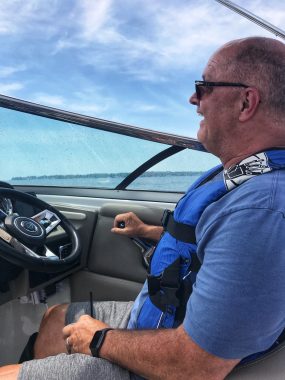How ALS Weakness Made My Husband Stronger
Living life to the fullest in the face of ALS

If you asked my late husband, Jeff, what he’d lost while living with ALS, he might have told you via text-to-speech technology that he missed his voice. His dry wit, irreverence, and affinity for gentle teasing relied, in some part, on his ability to speak.
Or he might have shared his frustration with how spoken conversation went on around him and without him. By the time he’d typed out what he wanted to say, the discussion had moved on.
But most likely he’d have told you that he missed “being strong.” ALS causes weakness as motor neurons stop communicating with muscles, rendering them paralyzed. Physical strength was my husband’s defining characteristic. A retired Bureau of Alcohol, Tobacco, Firearms and Explosives agent and competitive bicyclist, Jeff spent his life using his body.
Mostly, though, he counted on strength to do thoughtful things for people he loved.
Years of helping his dad with projects around the yard and house had honed his carpentry skills to the point of artistry. Jeff used those talents to design and build a treehouse for his best friend’s kids. For other friends, he crafted a stone retaining wall that spanned the length of their sloping driveway. For his daughter, he built a headboard from an old fence that lined their backyard. And while we were dating, he’d covered my kitchen island with reclaimed wood from the old tobacco barn where my horse lived. He used the leftover wood to frame a picture of us.
So when ALS started robbing Jeff of his physical abilities, he resisted. He mowed our lawn, then he mowed the neighbor’s lawn. He replaced missing dock boards on our pier. He hand-painted a set of Michigan-shaped Adirondack chairs that I’d bought us as a housewarming gift one year.
This resistance I understood. Losing his physical strength meant losing an important piece of his identity, and I admired his desire to keep going, even if seeing him on a stepladder changing a lightbulb was scary.
But here’s what he didn’t see. While living with ALS, my husband’s real strengths — the ones that serve us best in a crisis, the ones that define our character rather than our cardio — grew. As his body failed him, his mind and heart took the lead.
In Jeff’s professional career, he’d been a first responder at some heartbreaking national disasters and frequently stayed on for weeks or months as part of the response team. When he shared these stories with me, I was struck not only by the expertise he brought to the crisis, but also by his composure, calm, and leadership. Even before ALS, he was someone I’d follow into battle.
So it wasn’t surprising when I saw these values kick into high gear on the day of our own disaster — the day his ALS was confirmed. Even expecting the news, we weren’t prepared to hear the neurologist say, “You have ALS.”
It was a gut punch.
It was also too early for brave faces. We held hands as we walked out of the ALS clinic. I can’t remember who drove, but I know it was Jeff who decided we were going for milkshakes before we even left Baltimore. Later, at home, he was quiet while savoring a cigar as we sat together on the front porch.
Then he said to me, “We’re going to live.”
Jeff didn’t mean, in that moment, that he was going to survive ALS. What he meant was, we’re going to live. We’re going to eat guacamole and rent powerboats and go see our friends’ kids play football. We’re going to have breakfast at Denny’s and play ball with the dog and drink coffee in bed.
Deciding to live fully and joyfully in the face of an ALS diagnosis takes far more strength than training for a bicycle race. Getting married not knowing whether ALS will end your marriage in two months, two years, or two decades takes more strength than fixing a pier. Responding to a terminal diagnosis by saying, “I’m going to live anyway, and I want you to do it with me” — that’s strength.
Jeff and I had this conversation often toward the end of his life. It troubled him to need so much physical help, as it reminded him that he’d lost his once-strong body.
“There’s nothing you can’t do,” I would tell him, truthfully, as he made something broken better than new. “You are the strongest person I have ever known.”

Jeff drives a powerboat in the Chesapeake Bay, 10 months after his ALS diagnosis. (Photo by Juliet Taylor)
Note: ALS News Today is strictly a news and information website about the disease. It does not provide medical advice, diagnosis, or treatment. This content is not intended to be a substitute for professional medical advice, diagnosis, or treatment. Always seek the advice of your physician or other qualified health provider with any questions you may have regarding a medical condition. Never disregard professional medical advice or delay in seeking it because of something you have read on this website. The opinions expressed in this column are not those of ALS News Today or its parent company, Bionews, and are intended to spark discussion about issues pertaining to ALS.








Dagmar Munn
Juliet, Congratulations on your debut column! Jeff certainly was strong in mind and spirit despite his ALS as well as throughout his ALS. I look forward to reading and learning about you both and the experiences you'll be sharing wit us. Dagmar
Juliet Taylor
Thank you so much, Dagmar! I appreciate you reading and thank you for your kindness and support. Your column has long inspired me. Juliet
Brenda Brown
Great article! Like you, I have watched ALS take so much from my husband, but it has not taken his positive attitude or his zest for living. His strength lifts us both and that is such a gift. Look forward to your future articles.
Juliet Taylor
Thank you, Brenda. I appreciate you reading and wish you and your husband the very best. Juliet
Dajia Steuber
Juliet, Thank you for your column. I really enjoyed it and related to what you said about your husband, Jeff and his journey with ALS. It helps me so much to not feel so alone in this crazy ALS journey my husband and I are navigating. - Dajia
Juliet Taylor
Hi Dajia, thank you so much for reading and sharing. You are not alone! Wishing you and your husband well. Juliet
John Hamilton
Beautifully written story! And, Boy! I can sure relate to Jeff's plight and how he dealt with it!
Juliet Taylor
Thank you so much for sharing, John! I am glad to hear our story is relatable. Wishing you the very best.
Dave Smiglewski
Thank you for your column. It is inspiring to read about Jeff and his "we're going to live" outlook. I have a very slow progression ALS and have had that same outlook: Don't wait, do it now and enjoy life, enjoy our family and friends, enjoy my interests in civic life, stay positive and look to the future. We don't know what might be around the corner but we can't wait to make that turn.
Thank you again!
Juliet Taylor
Hi Dave, you said it better than I ever could! Don't wait - do it now. I'm so grateful for the time Jeff and I had together and the way in which we lived it. Thank you for taking the time to read my column and for the insightful comment, I appreciate you. Juliet
Len Jax
Hi Juliet,
Welcome - I loved your debut column! Many of the same thoughts, feelings, and losses that Jeff had have also graced my life.
I have learned that a progressive disease forces one to deal with loss daily. I compare it to getting shot each day – but there is no bullet hole, no blood – it is neat and tidy, but a tiny piece of me is missing when I awake each day.
My loss of strength was huge, but the loss of speech is currently the winner. Text-to-speech apps leave me in the dust as I have lost finger dexterity and am now a two-finger wonder! Like Jeff, my verbal teasing and irreverence lose something in adult conversations. Using the app with grandchildren is even sadder as they move on and won't wait for you.
Having a neurodegenerative disease such as ALS gives one ample time to contemplate the deeper meaning of many issues in life. With the loss of speech, my reality is a quiet world unto myself and my thoughts. One must find peace with that fact. I no longer have the luxury of discussing pressing issues in-depth with anyone other than myself. So, I listen, contemplate, and try to understand the world as it is now. It is a daily struggle, experiencing sadness, grieving the loss, adapting what one can, and moving toward acceptance.
Len
Juliet Taylor
Dear Len, thank you so much for reading my column and for taking the time to write this thoughtful response. I'm so glad you did. One of my sadnesses from our time with ALS was Jeff's loss of speech, because our relationship relied so much on it. I missed his teasing, and I always enjoyed his take on world events. He was good about helping me learn to be patient as he wrote down his thoughts, and helping me advocate for him when the conversation moved on too quickly. I really appreciate your insights about what it's like, first-hand, and your sentence about moving toward acceptance is so poignant. Thanks again for reading, I look forward to your future thoughts. Juliet
Julie Spechler Fink
Juliet,
Your story was my story. I feel you sister. I lost my soulmate in 2018 to this horrific disease. Thank you for sharing your writing(s).
Julie
judy pate
.me and my husband go see a neurologist soon hestared choking during meals he is very weak in legs and arms he can hardly talk It is hard to get into a neurologist